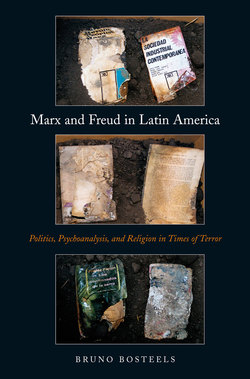Marx and Freud in Latin America

Реклама. ООО «ЛитРес», ИНН: 7719571260.
Оглавление
Bruno Bosteels. Marx and Freud in Latin America
Отрывок из книги
MARX AND FREUD
IN LATIN AMERICA
.....
The present book thus seeks to reassess the untimely relevance of certain aspects of the work of Marx (but also of Lenin and Mao) and Freud (but also of Lacan) in and for Latin America, with select case studies drawn from Mexico, Argentina, Chile, and Cuba. Starting from the abovementioned premise that Marxism and Freudianism strictly speaking are neither philosophical worldviews nor positive sciences, but rather intervening doctrines of the subject respectively in political and clinical-affective situations, I argue in the chapters of the book that art and literature—the novel, poetry, theater, film—no less than the militant tract or the theoretical treatise, provide symptomatic sites for the investigation of such processes of subjectivization. I will discuss almost none of the major recognized figures behind the various Communist (Marxist-Leninist, Trotskyist, Guevarist, Maoist) parties in Latin America—such as Julio Antonio Mella in Cuba, José Carlos Mariátegui and Víctor Raúl Haya de la Torre in Peru, Farabundo Martí and Roque Dalton in El Salvador, Vicente Lombardo Toledano in Mexico, René Zavaleta Mercado and Guillermo Lora in Bolivia, Marta Harnecker in Chile, Cuba and Venezuela, Luis Carlos Prestes or Caio Prado Júnior in Brazil, Luis Emilio Recabarren or Salvador Allende in Chile, Rodney Arismendi in Uruguay, or Aníbal Ponce and Otto Vargas in Argentina.41 Nor do I have any pretension—or the wherewithal—to retell the official history of the different national affiliates of the International Psychoanalytical Association (IPA), many of which are gathered in overarching organizations such as the FEPAL, or Federación Psicoanalítica de América Latina (Psychoanalytic Federation of Latin America, formerly known as COPAL, or Coordinating Committee of Psychoanalytic Organizations of Latin America).42 My justification for not taking this canonical route is twofold: first, because large parts of the history of the reception of Marx and Freud in their national and institutional venues have already been published; and, second, because the heretical treatments of Marxism and Freudianism in literary, artistic, and critical-theoretical form are often far more acutely aware of the shortcomings and the as-yet-untapped resources of Marx and Freud in and for Latin America. Besides, I might add that, just as I do not discuss any of the major intellectuals of the different Internationals linked to the legacies of Marx and Freud, so too most of the figures discussed in this book are absent from the extant histories of the reception of Marxism and psychoanalysis in Latin America—the principal exception in this last regard being the Cuban writer and freedom fighter José Martí.
To be sure, not all ten chapters of this book combine, or even seek to combine, equal parts from both Marxism and psychoanalysis. None aim to refer the works under discussion either to some prior orthodoxy or to some longed-for univocity based on these two discourses. Some chapters even discuss texts such as a series of pulp-fiction detective novels that may appear at first sight to be only remotely related to the topic of Marx and Freud in Latin America. In each case, however, I attempt to tease out a theoretical framework from the texts themselves, to the point where an author who is the object of analysis in one chapter can become the methodological reference point with which to analyze the objects of study in another. In fact, if there exists a standard against which I would like this book to be measured, aside from a penchant to go against the grain of accepted readings, it would be the idea of breaking down the traditional lines of demarcation between object and subject, criticism and theory, or literature and philosophy. Marxism and psychoanalysis, in this sense, serve as jumping-off points toward a renewed understanding of what I would gladly call “critical theory”—an intellectual practice for which criticism is not simply an ancillary qualification of theory but instead refers back to the specific tasks of close reading, as in literary or film criticism.43 Finally, at key points in this book and again at the very end, politics and psychoanalysis enter into dialogue with religion not only by way of a historical critique of Christianity or of the role of liberation theology in Latin America, but also through a brief return to “On the Jewish Question”—that is, to Marx’s text, as well as to some of the broader issues surrounding the question of religion whereof echoes can still be heard in the many writings by and on Freud such as The Future of an Illusion.
.....